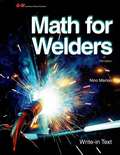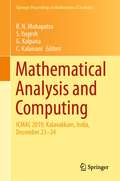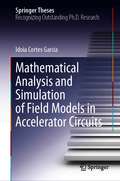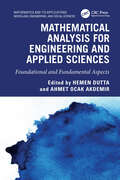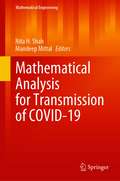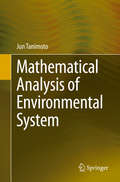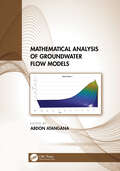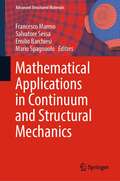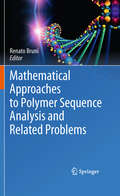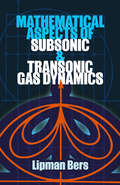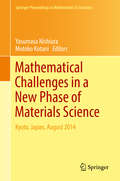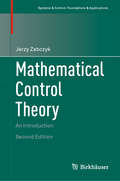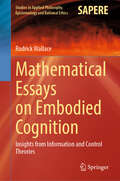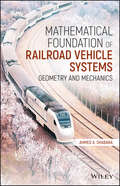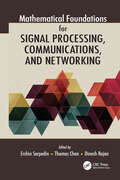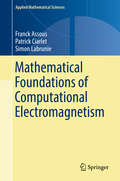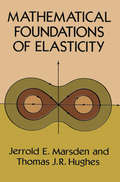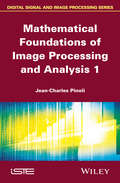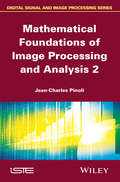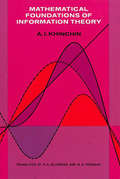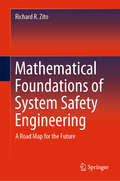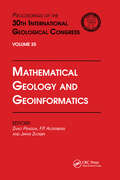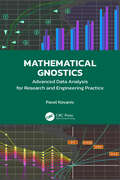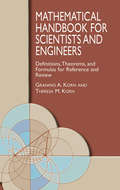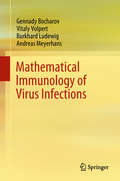- Table View
- List View
Math for Welders
by Nino MarionMath for Welders is a combination text and workbook designed to help welding students learn and apply basic math skills. The basic concept behind each math operation is explained at the opening of the unit. Next, students are given clear instruction for performing the operation. Each unit includes a variety of welding related practice problems to reinforce what the students have learned. The practice problems are identical to the types of problems the students will be required to solve in a welding shop. In addition to teaching basic math concepts, the problems give students a preview of the types of challenges they will face in a work environment. This helps the students develop solid troubleshooting skills that will serve them throughout their careers as welders.
Mathematical Analysis and Computing: ICMAC 2019, Kalavakkam, India, December 23–24 (Springer Proceedings in Mathematics & Statistics #344)
by R. N. Mohapatra S. Yugesh G. Kalpana C. KalaivaniThis book is a collection of selected papers presented at the International Conference on Mathematical Analysis and Computing (ICMAC 2019) held at Sri Sivasubramaniya Nadar College of Engineering, Chennai, India, from 23–24 December 2019. Having found its applications in game theory, economics, and operations research, mathematical analysis plays an important role in analyzing models of physical systems and provides a sound logical base for problems stated in a qualitative manner. This book aims at disseminating recent advances in areas of mathematical analysis, soft computing, approximation and optimization through original research articles and expository survey papers. This book will be of value to research scholars, professors, and industrialists working in these areas.
Mathematical Analysis and Simulation of Field Models in Accelerator Circuits (Springer Theses)
by Idoia Cortes GarciaThis book deals with the analysis and development of numerical methods for the time-domain analysis of multiphysical effects in superconducting circuits of particle accelerator magnets. An important challenge is the simulation of “quenching”, i.e. the transition of a material from the superconducting to the normally electrically conductive state. The book analyses complex mathematical structures and presents models to simulate such quenching events in the context of generalized circuit elements. Furthermore, it proposes efficient parallelized algorithms with guaranteed convergence properties for the simulation of multiphysical problems. Spanning from theoretical concepts to applied research, and featuring rigorous mathematical presentations on one side, as well as simplified explanations of many complex issues, on the other side, this book provides graduate students and researchers with a comprehensive introduction on the state of the art and a source of inspiration for future research. Moreover, the proposed concepts and methods can be extended to the simulation of multiphysical phenomena in different application contexts.
Mathematical Analysis for Engineering and Applied Sciences: Foundational and Fundamental Aspects (Mathematics and its Applications)
by Hemen Dutta Ahmet Ocak AkdemirThe book explores a range of mathematical topics essential for application in engineering and applied sciences. It explores both the theoretical and practical aspects, providing a comprehensive foundation for the development of robust theories applicable to engineering and applied sciences.Mathematical Analysis for Engineering and Applied Sciences: Foundational and Fundamental Aspects discusses the essential mathematical principles that underpin the fields of applied science and engineering. This comprehensive book explores a blend of pure and applied mathematics, demonstrating how mathematical tools and techniques can be utilized to create a wide range of models for practical applications in these disciplines. It addresses the challenges of handling complex phenomena and provides algorithms, methods, and logical concepts that are invaluable for bioengineering, cryptosystems, surface modeling, and various other engineering applications.Individual researchers, educators, students, and department libraries will find this book of interest.
Mathematical Analysis for Transmission of COVID-19 (Mathematical Engineering)
by Nita H. Shah Mandeep MittalThis book describes various mathematical models that can be used to better understand the spread of novel Coronavirus Disease 2019 (COVID-19) and help to fight against various challenges that have been developed due to COVID-19. The book presents a statistical analysis of the data related to the COVID-19 outbreak, especially the infection speed, death and fatality rates in major countries and some states of India like Gujarat, Maharashtra, Madhya Pradesh and Delhi. Each chapter with distinctive mathematical model also has numerical results to support the efficacy of these models. Each model described in this book provides its unique prediction policy to reduce the spread of COVID-19. This book is beneficial for practitioners, educators, researchers and policymakers handling the crisis of COVID-19 pandemic.
Mathematical Analysis of Environmental System
by Jun TanimotoThis book is for all graduate students who are specializing in any environmental issue and who wish to grasp the fundamentals of physics that are required in various fields of science and engineering. The book provides the structural concept of the system state equation and its dynamics, which can be applicable to numerical solutions in several important areas such as heat and mass transfer and fluid dynamics. As a first step, there is a description of how to solve a linear system by conducting an analysis of temperature distribution in an infinite soil as a practical example. This exercise helps readers to fully understand what time and space discretizations are, and how actual numerical solutions should work. Because the concept of the system state equation relies on a vector-matrix form, the book shows how that particular form is applicable to other practical procedures: linear multi regression analysis, the least square method, and others. The book also gives the solution to non-linear dynamical systems and their applications. Although this book may appear to take an unusual approach, the author believes it will be inspiring and greatly helpful for the beginner who seeks a solid understanding of the basis of mathematics and physics for any environmental problems.
Mathematical Analysis of Groundwater Flow Models
by Abdon AtanganaThis book provides comprehensive analysis of a number of groundwater issues, ranging from flow to pollution problems. Several scenarios are considered throughout, including flow in leaky, unconfined, and confined geological formations, crossover flow behavior from confined to confined, to semi-confined to unconfined and groundwater pollution in dual media. Several mathematical concepts are employed to include into the mathematical models’ complexities of the geological formation, including classical differential operators, fractional derivatives and integral operators, fractal mapping, randomness, piecewise differential, and integral operators. It suggests several new and modified models to better predict anomalous behaviours of the flow and movement of pollution within complex geological formations. Numerous mathematical techniques are employed to ensure that all suggested models are well-suited, and different techniques including analytical methods and numerical methods are used to derive exact and numerical solutions of different groundwater models. Features: Includes modified numerical and analytical methods for solving new and modified models for groundwater flow and transport Presents new flow and transform models for groundwater transport in complex geological formations Examines fractal and crossover behaviors and their mathematical formulations Mathematical Analysis of Groundwater Flow Models serves as a valuable resource for graduate and PhD students as well as researchers working within the field of groundwater modeling.
Mathematical Applications in Continuum and Structural Mechanics (Advanced Structured Materials #127)
by Salvatore Sessa Mario Spagnuolo Emilio Barchiesi Francesco MarmoThis book presents a range of research projects focusing on innovative numerical and modeling strategies for the nonlinear analysis of structures and metamaterials. The topics covered concern various analysis approaches based on classical finite element solutions, structural optimization, and analytical solutions in order to present a comprehensive overview of the latest scientific advances. Although based on pioneering research, the contributions are focused on immediate and direct application in practice, providing valuable tools for researchers and practicing professionals alike.
Mathematical Approaches to Polymer Sequence Analysis and Related Problems
by Renato BruniAn edited volume describing the latest developments in approaching the problem of polymer sequence analysis, with special emphasis on the most relevant biopolymers (peptides and DNA) but not limited to them. The chapters will include peptide sequence analysis, DNA sequence analysis, analysis of biopolymers and nonpolymers, sequence alignment problems, and more.
Mathematical Aspects of Subsonic and Transonic Gas Dynamics
by Lipman BersThis concise volume by a prominent mathematician offers an important survey of mathematical aspects of the theory of compressible fluids. The treatment is geared toward advanced undergraduates and graduate students in physics, applied mathematics, and engineering. Focusing on two-dimensional steady potential flows, the text eschews detailed proofs in favor of clear indications of the main ideas and descriptions of new mathematical concepts and methods that arose in connection with these chapters in fluid dynamics.Starting with a general discussion of the differential equations of a compressible gas flow, the book advances to the mathematical background of subsonic flow theory. Subsequent chapters explore the behavior of a flow at infinity and methods for the determination of flows around profiles, flows in channels and with a free boundary, the mathematical background of transonic gas dynamics, and some problems in transonic flow. An extensive bibliography of 400 papers concludes the text.
Mathematical Challenges in a New Phase of Materials Science
by Motoko Kotani Yasumasa NishiuraThis volume comprises eight papers delivered at the RIMS International Conference "Mathematical Challenges in a New Phase of Materials Science", Kyoto, August 4-8, 2014. The contributions address subjects in defect dynamics, negatively curved carbon crystal, topological analysis of di-block copolymers, persistence modules, and fracture dynamics. These papers highlight the strong interaction between mathematics and materials science and also reflect the activity of WPI-AIMR at Tohoku University, in which collaborations between mathematicians and experimentalists are actively ongoing.
Mathematical Control Theory: An Introduction (Systems & Control: Foundations & Applications)
by Jerzy ZabczykThis textbook presents, in a mathematically precise manner, a unified introduction to deterministic control theory. With the exception of a few more advanced concepts required for the final part of the book, the presentation requires only a knowledge of basic facts from linear algebra, differential equations, and calculus.In addition to classical concepts and ideas, the author covers the stabilization of nonlinear systems using topological methods, realization theory for nonlinear systems, impulsive control and positive systems, the control of rigid bodies, the stabilization of infinite dimensional systems, and the solution of minimum energy problems.This second edition includes new chapters that introduce a variety of topics, such as controllability with vanishing energy, boundary control systems, and delayed systems. With additional proofs, theorems, results, and a substantially larger index, this new edition will be an invaluable resource for students and researchers of control theory.Mathematical Control Theory: An Introduction will be ideal for a beginning graduate course in mathematical control theory, or for self-study by professionals needing a complete picture of the mathematical theory that underlies the applications of control theory.From reviews of the first edition:At last! We did need an introductory textbook on control which can be read, understood, and enjoyed by anyone. Gian-Carlo Rota, The Bulletin of Mathematics BooksIt covers a remarkable number of topics...The exposition is excellent, and the book is a joy to read. A novel one-semester course covering both linear and nonlinear systems could be given...The book is an excellent one for introducing a mathematician to control theory. Bulletin of the AMSIndeed, for mathematicians who look for the basic ideas or a general picture about the main branches of control theory, I believe this book can provide an excellent bridge to this area. IEEE Control Systems Magazine
Mathematical Essays on Embodied Cognition: Insights from Information and Control Theories (Studies in Applied Philosophy, Epistemology and Rational Ethics #72)
by Rodrick WallaceThis book provides a unique formal foundation for the development of statistical tools useful in the exploration of observational and experimental data related to embodied cognition. The asymptotic limit theorems of information and control theories can be used to construct statistical tools analogous to -- but different from -- regression models for the study of the often highly punctuated cognitive phenomena embedded in and hence influenced by a surrounding ecosystem of which the phenomena are themselves part. The book builds probability models based on those theorems that incorporate embodiment at a number of scales and levels of organization, ranging from the effects of stress on the immune system within a higher organism, through institutional (and machine) cognition under challenge from adversaries, to the failure of public health institutions under pathogen challenge. In distinct contrast to the existing literature, many detailed, worked-out examples provide templates for sophisticated readers to build their own model/tool constructs.
Mathematical Foundation of Railroad Vehicle Systems: Geometry and Mechanics
by Ahmed A. ShabanaMASTER AND INTEGRATE THE GEOMETRY AND MECHANICS OF RAILROAD VEHICLE SYSTEM ENGINEERING WITH ONE PRACTICAL RESOURCEMathematical Foundation of Railroad Vehicle Systems: Geometry and Mechanics delivers a comprehensive treatment of the mathematical foundations of railroad vehicle systems. The book includes a strong emphasis on the integration of geometry and mechanics to create an accurate and accessible formulation of nonlinear dynamic equations and general computational algorithms that can be effectively used in the virtual prototyping, analysis, design, and performance evaluation of railroad vehicle systems.Using basic concepts, formulations, and computational algorithms, including mechanics-based approaches like the absolute nodal coordinate formulation (ANCF), readers will understand how to integrate the geometry and mechanics of railroad vehicle systems. The book also discusses new problems and issues in this area and describes how geometric and mechanical approaches can be used in derailment investigations.Mathematical Foundation of Railroad Vehicle Systems covers:The mathematical foundation of railroad vehicle systems through the integration of geometry and mechanics Basic concepts, formulations, and computational algorithms used in railroad vehicle system dynamics New mechanics-based approaches, like the ANCF, and their use to achieve an integration of geometry and mechanics Use of geometry and mechanics to study derailments New problems and issues in the area of railroad vehicle systemsDesigned for researchers and practicing engineers who work with railroad vehicle systems, Mathematical Foundation of Railroad Vehicle Systems: Geometry and Mechanics can also be used in senior undergraduate and graduate mechanical, civil, and electrical engineering programs and courses.
Mathematical Foundations for Signal Processing, Communications, and Networking
by Erchin Serpedin, Thomas Chen and Dinesh RajanMathematical Foundations for Signal Processing, Communications, and Networking describes mathematical concepts and results important in the design, analysis, and optimization of signal processing algorithms, modern communication systems, and networks. Helping readers master key techniques and comprehend the current research literature, the book offers a comprehensive overview of methods and applications from linear algebra, numerical analysis, statistics, probability, stochastic processes, and optimization. From basic transforms to Monte Carlo simulation to linear programming, the text covers a broad range of mathematical techniques essential to understanding the concepts and results in signal processing, telecommunications, and networking. Along with discussing mathematical theory, each self-contained chapter presents examples that illustrate the use of various mathematical concepts to solve different applications. Each chapter also includes a set of homework exercises and readings for additional study. This text helps readers understand fundamental and advanced results as well as recent research trends in the interrelated fields of signal processing, telecommunications, and networking. It provides all the necessary mathematical background to prepare students for more advanced courses and train specialists working in these areas.
Mathematical Foundations of Computational Electromagnetism (Applied Mathematical Sciences #198)
by Franck Assous Patrick Ciarlet Simon LabrunieThis book presents an in-depth treatment of various mathematical aspects of electromagnetism and Maxwell's equations: from modeling issues to well-posedness results and the coupled models of plasma physics (Vlasov-Maxwell and Vlasov-Poisson systems) and magnetohydrodynamics (MHD). These equations and boundary conditions are discussed, including a brief review of absorbing boundary conditions. The focus then moves to well‐posedness results. The relevant function spaces are introduced, with an emphasis on boundary and topological conditions. General variational frameworks are defined for static and quasi-static problems, time-harmonic problems (including fixed frequency or Helmholtz-like problems and unknown frequency or eigenvalue problems), and time-dependent problems, with or without constraints. They are then applied to prove the well-posedness of Maxwell’s equations and their simplified models, in the various settings described above. The book is completed with a discussion of dimensionally reduced models in prismatic and axisymmetric geometries, and a survey of existence and uniqueness results for the Vlasov-Poisson, Vlasov-Maxwell and MHD equations. The book addresses mainly researchers in applied mathematics who work on Maxwell’s equations. However, it can be used for master or doctorate-level courses on mathematical electromagnetism as it requires only a bachelor-level knowledge of analysis.
Mathematical Foundations of Elasticity
by Jerrold E. Marsden Thomas J. HughesThis advanced-level study approaches mathematical foundations of three-dimensional elasticity using modern differential geometry and functional analysis. It is directed to mathematicians, engineers and physicists who wish to see this classical subject in a modern setting with examples of newer mathematical contributions. Prerequisites include a solid background in advanced calculus and the basics of geometry and functional analysis.The first two chapters cover the background geometry - developed as needed - and use this discussion to obtain the basic results on kinematics and dynamics of continuous media. Subsequent chapters deal with elastic materials, linearization, variational principles, the use of functional analysis in elasticity, and bifurcation theory. Carefully selected problems are interspersed throughout, while a large bibliography rounds out the text.
Mathematical Foundations of Image Processing and Analysis
by Jean-Charles PinoliImage processing and image analysis are typically important fields in information science and technology. By “image processing”, we generally understand all kinds of operation performed on images (or sequences of images) in order to increase their quality, restore their original content, emphasize some particular aspect of the information or optimize their transmission, or to perform radiometric and/or spatial analysis. By “image analysis” we understand, however, all kinds of operation performed on images (or sequences of images) in order to extract qualitative or quantitative data, perform measurements and apply statistical analysis. Whereas there are nowadays many books dealing with image processing, only a small number deal with image analysis. The methods and techniques involved in these fields of course have a wide range of applications in our daily world: industrial vision, material imaging, medical imaging, biological imaging, multimedia applications, satellite imaging, quality control, traffic control, and so on
Mathematical Foundations of Image Processing and Analysis, Volume 2
by Jean-Charles PinoliMathematical Imaging is currently a rapidly growing field in applied mathematics, with an increasing need for theoretical mathematics. This book, the second of two volumes, emphasizes the role of mathematics as a rigorous basis for imaging sciences. It provides a comprehensive and convenient overview of the key mathematical concepts, notions, tools and frameworks involved in the various fields of gray-tone and binary image processing and analysis, by proposing a large, but coherent, set of symbols and notations, a complete list of subjects and a detailed bibliography. It establishes a bridge between the pure and applied mathematical disciplines, and the processing and analysis of gray-tone and binary images. It is accessible to readers who have neither extensive mathematical training, nor peer knowledge in Image Processing and Analysis. It is a self-contained book focusing on the mathematical notions, concepts, operations, structures, and frameworks that are beyond or involved in Image Processing and Analysis. The notations are simplified as far as possible in order to be more explicative and consistent throughout the book and the mathematical aspects are systematically discussed in the image processing and analysis context, through practical examples or concrete illustrations. Conversely, the discussed applicative issues allow the role of mathematics to be highlighted. Written for a broad audience – students, mathematicians, image processing and analysis specialists, as well as other scientists and practitioners – the author hopes that readers will find their own way of using the book, thus providing a mathematical companion that can help mathematicians become more familiar with image processing and analysis, and likewise, image processing and image analysis scientists, researchers and engineers gain a deeper understanding of mathematical notions and concepts.
Mathematical Foundations of Information Theory (Dover Books on Mathematics)
by A. Ya. KhinchinThe first comprehensive introduction to information theory, this book places the work begun by Shannon and continued by McMillan, Feinstein, and Khinchin on a rigorous mathematical basis. For the first time, mathematicians, statisticians, physicists, cyberneticists, and communications engineers are offered a lucid, comprehensive introduction to this rapidly growing field.In his first paper, Dr. Khinchin develops the concept of entropy in probability theory as a measure of uncertainty of a finite “scheme,” and discusses a simple application to coding theory. The second paper investigates the restrictions previously placed on the study of sources, channels, and codes and attempts “to give a complete, detailed proof of both … Shannon theorems, assuming any ergodic source and any stationary channel with a finite memory.”Partial Contents: I. The Entropy Concept in Probability Theory — Entropy of Finite Schemes. The Uniqueness Theorem. Entropy of Markov chains. Application to Coding Theory. II. On the Fundamental Theorems of Information Theory — Two generalizations of Shannon’s inequality. Three inequalities of Feinstein. Concept of a source. Stationarity. Entropy. Ergodic sources. The E property. The martingale concept. Noise. Anticipation and memory. Connection of the channel to the source. Feinstein’s Fundamental Lemma. Coding. The first Shannon theorem. The second Shannon theorem.
Mathematical Foundations of System Safety Engineering: A Road Map for the Future
by Richard R. ZitoThis graduate-level textbook elucidates low-risk and fail-safe systems in mathematical detail. It addresses, in particular, problems where mission-critical performance is paramount, such as in aircraft, missiles, nuclear reactors and weapons, submarines, and many other types of systems where “failure” can result in overwhelming loss of life and property. The book is divided into four parts: Fundamentals, Electronics, Software, and Dangerous Goods. The first part on Fundamentals addresses general concepts of system safety engineering that are applicable to any type of system. The second part, Electronics, addresses the detection and correction of electronic hazards. In particular, the Bent Pin Problem, Sneak Circuit Problem, and related electrical problems are discussed with mathematical precision. The third part on Software addresses predicting software failure rates as well as detecting and correcting deep software logical flaws (called defects). The fourth part on Dangerous Goods presents solutions to three typical industrial chemical problems faced by the system safety engineer during the design, storage, and disposal phases of a dangerous goods’ life cycle.
Mathematical Geology and Geoinformatics: Proceedings of the 30th International Geological Congress, Volume 25
by Zhao Pengda F. P. Agterberg Jiang ZuoqinThis book presents the proceedings of the 30th International Geological Congress, providing information on geological hazards map and image analytical systems, mineral resources with integrated information, phase-separation analysis, mineral reserve estimation, and geosciences and management information systems.
Mathematical Gnostics: Advanced Data Analysis for Research and Engineering Practice
by Pavel KovanicThe book describes the theoretical principles of nonstatistical methods of data analysis but without going deep into complex mathematics. The emphasis is laid on presentation of solved examples of real data either from authors' laboratories or from open literature. The examples cover wide range of applications such as quality assurance and quality control, critical analysis of experimental data, comparison of data samples from various sources, robust linear and nonlinear regression as well as various tasks from financial analysis. The examples are useful primarily for chemical engineers including analytical/quality laboratories in industry, designers of chemical and biological processes. Features: Exclusive title on Mathematical Gnostics with multidisciplinary applications, and specific focus on chemical engineering. Clarifies the role of data space metrics including the right way of aggregation of uncertain data. Brings a new look on the data probability, information, entropy and thermodynamics of data uncertainty. Enables design of probability distributions for all real data samples including smaller ones. Includes data for examples with solutions with exercises in R or Python. The book is aimed for Senior Undergraduate Students, Researchers, and Professionals in Chemical/Process Engineering, Engineering Physics, Stats, Mathematics, Materials, Geotechnical, Civil Engineering, Mining, Sales, Marketing and Service, and Finance.
Mathematical Handbook for Scientists and Engineers: Definitions, Theorems, and Formulas for Reference and Review (Dover Civil and Mechanical Engineering)
by Granino A. Korn Theresa M. KornA reliable source of definitions, theorems, and formulas, this authoritative handbook provides convenient access to information from every area of mathematics. Coverage includes Fourier transforms, Z transforms, linear and nonlinear programming, calculus of variations, random-process theory, special functions, combinatorial analysis, numerical methods, game theory, and much more.
Mathematical Immunology of Virus Infections
by Burkhard Ludewig Gennady Bocharov Vitaly Volpert Andreas MeyerhansThis monograph concisely but thoroughly introduces the reader to the field of mathematical immunology. The book covers first basic principles of formulating a mathematical model, and an outline on data-driven parameter estimation and model selection. The authors then introduce the modeling of experimental and human infections and provide the reader with helpful exercises. The target audience primarily comprises researchers and graduate students in the field of mathematical biology who wish to be concisely introduced into mathematical immunology.
